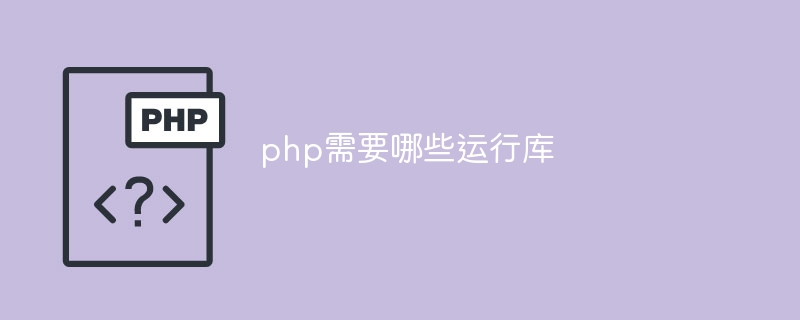Home >Backend Development >PHP Problem >What runtime libraries do php need?
What runtime libraries do php need?
- zbtOriginal
- 2023-07-24 15:37:041868browse
The runtime libraries required by php are: 1. ZipArchive, used to store and obtain data; 2. cURL, used to transmit data; 3. GD library, an open source library used to create and operate images; 4. OpenSSL, which provides the function of encrypted communication with SSL and TLS; 5. XML and SimpleXML, markup languages for storing and transmitting data; 6. SOAP, a protocol for exchanging structured information between networks; 7. JSON, PHP provides functions for parsing and generating JS; 8. ZipArchive.

The operating environment of this tutorial: windows10 system, php8.1.3 version, DELL G3 computer.
PHP(Hypertext Preprocessor) is a widely used open source server-side scripting language that can be embedded into HTML and used to create dynamic web pages. Although PHP itself already provides many powerful features, in some cases, in order to achieve more advanced functions, some additional runtime libraries are needed.
The following are some common PHP runtime libraries:
1. MySQL (or other database library): MySQL is a popular relational database management system for storing and retrieving data. PHP provides the ability to access the MySQL database through the MySQL runtime library. It also supports other databases, such as PostgreSQL, Oracle, etc. Using the MySQL runtime library, you can easily connect to the database, execute SQL queries, obtain and update data, etc.
2. cURL: cURL is a multi-protocol, multi-functional command line tool and library for transferring data. In PHP, the cURL library provides interfaces for seamless access to various protocols such as HTTP, FTP, SMTP, etc. Using the cURL library, you can easily send HTTP requests, obtain remote content, handle file uploads, etc.
3. GD Library: The GD Library is an open source library for creating and manipulating images. PHP provides integration with the GD library, allowing the generation and manipulation of images, such as creating thumbnails, adding watermarks, image processing, etc. The GD library also supports various image formats such as JPG, PNG, GIF, etc.
4. OpenSSL: OpenSSL is an open source implementation of the Secure Sockets Layer (SSL) and Transport Layer Security (TLS) protocols. In PHP, the OpenSSL library provides functionality for encrypted communication with SSL and TLS. Using the OpenSSL library, secure connections like HTTPS can be easily created and managed.
5. XML and SimpleXML: XML is a markup language used to store and transmit data. PHP provides libraries for the creation, parsing, and manipulation of XML documents. The SimpleXML library is an extension library for PHP that provides parsing and manipulation of XML documents through a simple API.
6. SOAP: SOAP (Simple Object Access Protocol) is a protocol for exchanging structured information between networks. PHP provides support for the SOAP protocol through the SOAP extension library. Using the SOAP library, remote calls and communications can be made through web services.
7. JSON:JSON(JavaScript Object Notation) is a lightweight data exchange format. PHP provides libraries for parsing and generating JSON data, allowing PHP to easily process data in JSON format.
8. ZipArchive: The ZipArchive library provides an interface for the creation and operation of ZIP files. Using the ZipArchive library, you can easily create, decompress and manage ZIP files.
In addition to the runtime libraries listed above, there are many other PHP runtime libraries to choose from to achieve various functions. By using these runtime libraries, PHP developers can more easily implement various complex functions and tasks and improve development efficiency. .
The above is the detailed content of What runtime libraries do php need?. For more information, please follow other related articles on the PHP Chinese website!

